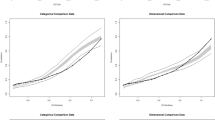Abstract
Two self-report methods of monitoring male sexuality have been compared—an ongoing method in the form of a diary card and one eliciting retrospective reports in the form of a monthly sexuality interview. Male volunteers were assigned at random to three testing conditions: (a) diary card and monthly interview for 3 months (N=29); (b) three monthly interviews (N=18); and (c) pre- and postinterview only, separated by 2 months (N=21). The correspondence among frequency reports, quality ratings, and number of sexual problems as obtained in diary card and interview measures was examined for respondents in the first condition, revealing that coital frequency and quality ratings were generally quite similar in the two modes of assessment. Interview responses for all subjects were examined for the existence of differential reactive effects according to the frequency of the assessment regimen. No differences emerged among conditions, although a trend for all groups over time was identified. Implications of the results are considered for clinical trials monitoring the effects of new contraceptive methods on sexual functioning.
Similar content being viewed by others
References
Barlow, D.Handbook of Behavioral Assessment. New York: Wiley, 1977.
Campbell, D. T., and Stanley, J. C.Experimental and Quasi Experimental Designs for Research. Chicago: Rand McNally, 1963.
Clark, A., and Wallin, P. The accuracy of husbands' and wives' reports of frequency of marital coitus.Population Studies 1964,18 165–173.
Davidson, M., and Toperak, J.BMDP Manual. Los Angeles: Los Angeles University of California Press, 1981.
Dennerstein, L., and Burrows, G. Oral contraception and sexuality.Medical Journal of Australia 1976,1 796–978.
Edwards, J. S. Words vs. records: A practical behavior recording exercise for psychology courses.Teaching of Psychology 1976,3 35–37.
Freud, M., and Davis, J. E. A follow up study of the effects of vasectomy on sexual behavior.Journal of Sexual Research 1974,9 241.
Fujita, B. N., Waener, N. N., Perthou, N., and Pion, R. J. The effects of an interview on attitudes and behavior.Journal of Sexual Research 1971,7 138–152.
Getzels, J. W. The question answer process: A conceptualization and some derived hypotheses for empirical examination.Public Opinion Quarterly 1954,18 80–91.
Glaser, E. M. Experiments on the side effects of drugs.British Journal of Pharmacology 1953,8 187–192.
Glaser, E. M., and Whittow, G. C. Experimental errors in clinical trials.Clinical Science 1954,13 199–210.
Hoffman, L. W., and Lippitt, R.Handbook of research methods in child development. New York: Wiley, 1960.
James, W. H. The reliability of the reporting of coital frequency.Journal of Sexual Research 1971,7 312–314.
Mann, E. C.Anxiety in comprehensive patient care: Where general medicine and psychiatry meet. New York, American Elsevier, 1973.
Persky, H., Strauss, D., Lief, H. I., Miller, W. R., and O'Brien, C. P. Effect of the research process on human sexual behavior.Journal Psychiatric Research 1981,16 41–52.
Pfeiffer, E., Verwoerdt, A., and Wang, H. S. Sexual behavior in aged men and women.Archives of General Psychiatry 1968,19 753–758.
Platt, S. On establishing the validity of objective data: Can we rely on cross interview agreement.Psychological Medicine 1980, 10, 573–581.
Rosenthal, R.Experimental effects in behavioral research. New York, Henry Holt, 1966.
Rubin, Z., and Mitchell, C. Couples research as couples counseling. Some unintended effects of studying class relationships.American Psychologist 1976,31 17–25.
Rutter, M., and Brown, G. W. The reliability of measures of family life and relationships in families containing a psychiatric patient.Social Psychiatry 1966,1 38–53.
Shaffer, J. W. On the analysis of repeated measures over time in medical, pharmacological and behavioral research.Jour of Behavioral Medicine 1979,2 221–238.
Spanier, G. B. Use of recall data in survey research on human sexual behavior.Social Biology 1976,23 244–253.
Terman, L. M.Psychological factors in marital happiness. New York: McGraw-Hill, 1938.
Udry, J. R., and Morris, N. M. A method for validation of reported sexual data.Journal of Marriage and Family 1967,29 442–446.
Wiest, W. M., and Janke, L. D. A methodological critique of research on psychological effects of vasectomy.Psychosomatic Medicine 1974,36 438–449.
Wincze, J. P., Venditti, E., Barlow, D., and Mavissakalian, M. The effects of a subjective monitoring task in the physiological measure of genital response to erotic stimulation.Archives of Sexual Behavior 1980,9 533–545.
World Health Organization Psychosocial Task Force Report. Acceptability of drugs for male fertility regulation: A prospectus and some preliminary data.Contraception 1980,21 121–134.
Zufall, R. Vasectomy: Five to ten year follow up of 200 cases.Urology 1980,15 278–279.
Author information
Authors and Affiliations
Additional information
This study was supported by the World Health Organization's Special Programme of Research Development and Research Training in Human Reproduction (Project Nos. 76297 and 79003) and was conducted at King's College Hospital, London.
Rights and permissions
About this article
Cite this article
Reading, A.E. A comparison of the accuracy and reactivity of methods of monitoring male sexual behavior. Journal of Behavioral Assessment 5, 11–23 (1983). https://doi.org/10.1007/BF01343635
Accepted:
Issue Date:
DOI: https://doi.org/10.1007/BF01343635



